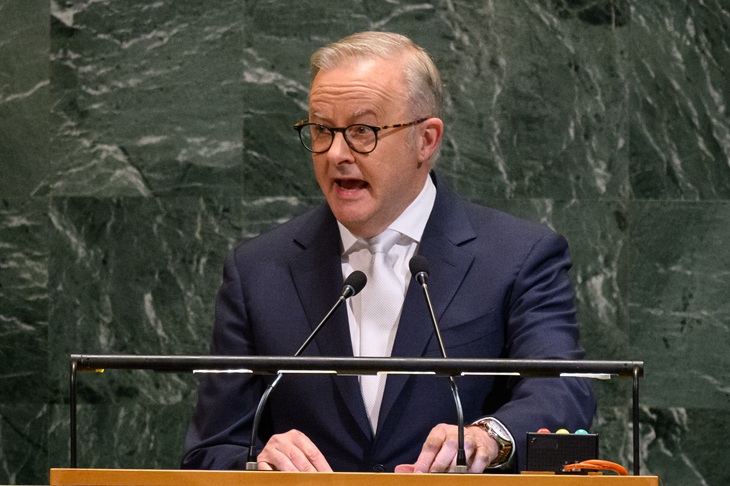
NEW YORK, NEW YORK - SEPTEMBER 24: Australian Prime Minister Anthony Albanese speaks at the 80th session of the UN’s General Assembly (UNGA) on September 24, 2025 in New York City. World leaders convened for the 80th session of UNGA, with this year’s theme for the annual global meeting being “Better together: 80 years and more for peace, development and human rights.” (Photo by Alexi J. Rosenfeld/Getty Images)
URGENT UPDATE: The Albanese government in Australia is under fire as critics claim its policies mirror the controversial era of former Prime Minister Kevin Rudd. Just two years since the Coalition was ousted, many Australians are expressing disillusionment with what they perceive as a return to ineffective governance.
Recent reports reveal that the Albanese administration is pouring billions into sectors such as childcare, aged care, and renewable energy, echoing Rudd’s approach to economic management. Critics argue that this resembles a nostalgia trip rather than a fresh start for the nation. The government’s spending spree is being described as an attempt at “progressive patriotism,” yet it raises alarms about sustainability and effectiveness.
Details are emerging about key figures in the Albanese Cabinet, many of whom served under Rudd. Notable names include Penny Wong at Foreign Affairs and Tanya Plibersek overseeing environment and water. Critics suggest this is less about innovation and more about a “reheated” cabinet filled with familiar faces. Chris Bowen, once Rudd’s Assistant Treasurer, is now accused of stifling the energy sector through stringent climate policies.
The ongoing concerns are compounded by the rising cost of living. Households across Australia are grappling with skyrocketing energy bills and stagnant wages, leading to heightened public frustration. Inflation is persistently impacting everyday Australians, making housing affordability a distant dream for many.
In a time of global economic uncertainty, the Albanese government’s strategy appears to lack the foresight needed to navigate challenges. Critics fear that the current administration is repeating Rudd’s mistakes, particularly in executing ambitious plans without a solid foundation. The previous government’s legacy included disastrous outcomes such as the botched home insulation program and a troubled National Broadband Network rollout.
Looking ahead, observers are questioning the sustainability of Albanese’s policies. With a lack of robust opposition, the government faces minimal checks on its potentially reckless spending. As the political landscape evolves, citizens are left wondering if history is destined to repeat itself.
Next steps: The Albanese administration must address these criticisms swiftly or risk losing public confidence entirely. With Australia at a crossroads, the coming months will be crucial in determining whether Albanese can steer clear of the pitfalls that defined the Rudd era.
As developments unfold, this situation remains critical for all Australians. The question now is whether the Albanese government can adapt and address the pressing needs of its citizens before it’s too late.






